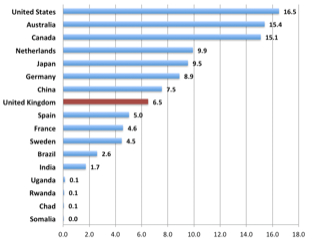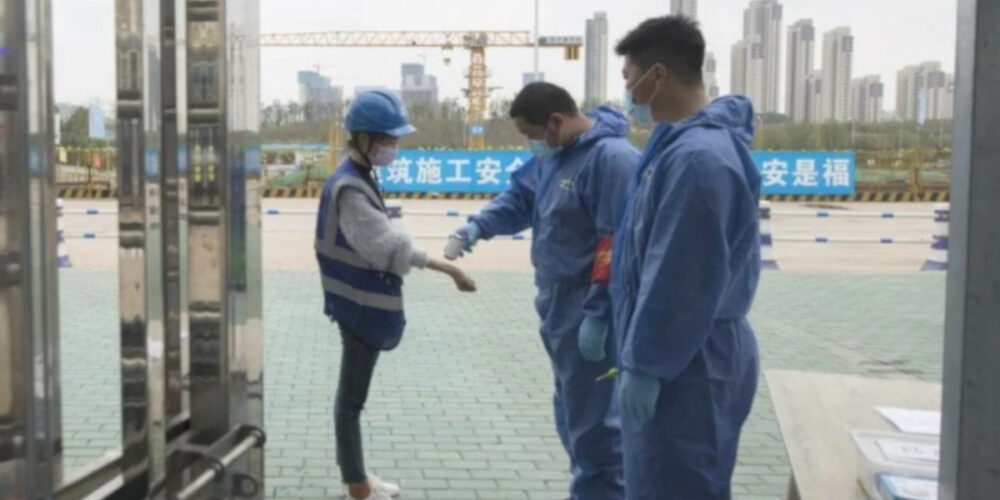This article seeks to explore the apparent contradictions inherent in China today and to examine the evidence relating to criticisms made of the Chinese state by some figures and organisations on the left. Broadly speaking, critiques of China from the left fall under three categories:
- that the rapid growth and development of China is a cause for concern for ecological reasons;
- that China engages in quasi-imperialism or “social-imperialism”, a criticism also levelled at the Soviet Union; and
- that China is a totalitarian state that abuses the human rights of its citizens.
The environmental question
A common criticism levelled at China from those in the West, on both the left and the right, is that it is engaging in unsustainable growth, which is leading to irreparable damage to the global environment.
If we look at bulk numbers of emissions, it’s undoubted that China places a heavy burden on the global environment. However, given its present population of approximately 1.4 billion, an examination of any per capita chart will show that China is still far behind nearly every country in the west.¹
Ultimately, a country’s borders are fairly abstract, so in gross numbers the country with the most people will always produce the “most” waste. This is why a measure per capita is important.
Additionally, while calling for China to curb its growth because of the “ticking clock” of inevitable global catastrophe is understandable, this ultimately ignores the centuries of enormous growth and consumption, which still continues, in the West. Do the people of China, and indeed all the other countries of the Global South, not deserve to enjoy the simple dignities we take for granted in the West, such as public transport infrastructure, well-maintained roads, widespread broadband internet connection, etc.?

The myth of global overpopulation is a commonly used bourgeois criticism of the developing South. This, however, ignores the waste inherent in an ever-expanding capitalist paradigm. We already produce more than enough food and commodities for the global population, and most forecasts show that the global population is levelling off. It therefore follows that the problem isn’t with a billion Chinese people wanting a moderate standard of living but rather with ceaseless expansion in the pursuit of profit, driven by political and economic interests based in the West.
It is also important to examine China’s response to the climate crisis relative to that in the West. In recent decades China has been able to marry a reduction in emissions with continuing alleviation of poverty. While the Western world prevaricates and hopes for a free-market solution to our climate crisis, China has orchestrated a number of large-scale and strategic environmental projects.
These include an ambitious national reforestation policy (with hundreds of billions of trees planted so far)² and a de-desertification effort that restored up to 40 per cent of forest in some former desert regions.³ It has developed the world’s largest green-energy sector, by several metrics,⁴ and is the biggest manufacturer and buyer globally of electric vehicles. It also has the largest and most sophisticated high-speed training network. These demonstrable, measurable efforts far outstrip those in the United States, Britain, and the EU.
China’s approach to the very loud and apparent needs of environmental and climate reform is only possible through the central structural principle that underpins the country. That is, through the guiding principles of Marxism-Leninism alongside socialism with Chinese characteristics and Mao Zedong thought. Only in a dictatorship of the proletariat, where the power of the state apparatus is guided by the fundamental needs of the working class, is it possible to achieve this desperately needed and profound change.
The imperialism question
“Socialist in words, imperialist in deeds” was Lenin’s critique of European countries before the First World War and specifically a criticism of the chauvinistic attitude of the Social Democratic Party of Germany. Later this same critique was used by Mao and Enver Hoxha to attack the Soviet Union, eventually leading towards the Sino-Soviet split. Ironically, many today see modern China as very much embodying this criticism.⁵
However, deeper analysis will show that there are qualitative differences between the imperialism of the West and the trade deals and infrastructure-building projects in the global south that constitute part of China’s “Belt and Road” programme. Consider, for example, trade partnerships between China and Africa. The former Liberian minister of public works Gyude Moore, speaking at the Paulson Institute in Chicago in 2019, laid out the broader African viewpoint on these partnerships, revealing the continuing legacy of colonialism and imperialism on the continent ($1 trillion worth of natural resources, still in the ground, belongs to 101 companies listed on the London Stock Exchange) and how, beginning at the start of the millennium, the trade deals with China offered a completely new experience for political leaders on the continent.
There remain some reasoned critiques of these enormous trade deals, namely that they stymie domestic development and saddle countries with large amounts of debt. However, it is important to note that they provide a way for the continent to break out and develop an infrastructure that is not based on old colonial lines of linking peripheral resource sites with central exporting areas. Instead, there is a chance to develop fully integrated road, railway and other networks that serve the needs of the African people.
On the question of debt it must be noted too that China regularly forgives these huge loans, which are invariably interest-free. This is a significant change to the previous paradigm for most African countries, where the rates of servicing loans to businesses in the West were (and still are) so high that they were unable to develop in any real sense.⁶
The human rights question
Some final words on Xinjiang and the claims of human rights abuses in China. You would be hard pressed to avoid some of the recent sensational claims made about the westernmost region of China, home to one of its fifty-five officially recognised minorities, the Uighur people.
These include the claim that up to 3 million Uighurs are detained in purported concentration camps. The great majority of these articles and claims can be traced back to one person, Adrian Zenz, a senior fellow at the explicitly pro-imperialist and anti-communist “Victims of Communism Memorial Foundation.” His method of obtaining his statistics is notoriously flimsy, and the way he applies this data is equally crude. Zenz manipulated data to try and claim that the Uighur population was decreasing in Xinjiang as part of the evidence that a genocide is taking place; the reality, however, is that the Uighur population is growing rapidly, far outstripping the increase in the Han population in the same region.⁷
Recently the International Criminal Court (not a noted pro-communist or pro-China organisation) concluded that there was insufficient evidence that China is carrying out a genocide in Xinjiang.⁸ This was recently echoed by the US State Department.⁹ Indeed China has been largely transparent in its anti-terrorism exercise, inviting delegations from majority-Muslim countries to inspect its work,¹⁰ describing the facilities in Xinjiang instead as “re-education” facilities to bring Uighurs away from Islamic extremism and offering them opportunities for employment and education. (It should be noted that this is extremely similar to an approach taken by France in recent years,¹¹ though it has not been subject to the same level of international scrutiny or criticism.) There is a global divide, with North America, Europe, Australia and New Zealand, and Japan (i.e. the West) actively condemning China’s actions while many in the Global South and other noted antagonists of the West support them. Notably, not one Muslim-majority country in the world condemns what is happening in Xinjiang, suggesting that, as ever, Western cries about human rights abuses may function as a proxy for other, more fundamental divides.
What unites these criticisms and attacks? They all originate from the West, and they all seek to discredit China on the world stage. However, as we should all know by now, the West lies. It lies to foment war, it lies to destabilise countries, it lies to deflect criticism. It lied about incinerators in Kuwait, it lied about nuclear weapons in Iran, it lied about weapons of mass destruction in Iraq. It is now lying about China, and will continue to do so as long as China presents a fundamental challenge to its authority and a threat to its political and economic system.
A powerful state apparatus, ideologically guided by the science of Marxism-Leninism, that remains true to the working class of a country is the only hope for our planet to escape the never-ending boom-bust cycles and environmental catastrophes that come with it. All on the left should look unambiguously to China as a country to defend, and as a country that demonstrates a real alternative to the power structures we have here in the West.
This does not mean that China should be exempt from reasoned critiques, or that we should invest blind faith in the country; but our critiques should come from a Marxist-Leninist viewpoint, a perspective that understands that the road from capitalism to socialism is an uneven one, fraught with contradictions. If ever there was a clear signpost that they’re heading in the right direction, however, surely lifting close to a billion people out of extreme poverty in forty years is a good indication that China is on the right path.¹²
References
- World Bank, “The World Bank in China” (https://data.worldbank.org/indicator/EN.ATM.CO2E.PC).
- Michael Shermer, “Why Malthus is still wrong,” Scientific American, 1 May 2016 (https://www.scientificamerican.com/article/why-malthus-is-still-wrong/).
- Bloomberg News, “China’s 40-year, billion-tree project is a lesson for the world” (https://www.bloomberg.com/news/articles/2020-09-14/china-s-40-year-billion-tree-project-is-a-lesson-for-the-world).
- World Bank, “Curbing desertification in China” (https://www.worldbank.org/en/news/feature/2019/07/04/china-fighting-desertification-and-boosting-incomes-in-ningxia).
- Xinhua World News, “Factbox: Achievements in China’s energy development,” 21 December 2020 (http://www.xinhuanet.com/english/2020-12/21/c_139607437.htm).
- Communist Party of India (Maoist), “China: A modern social-imperialist power,” 21 September 2018 (https://anti-imperialism.org/2018/09/21/china-a-modern-social-imperialist-power-cpimaoist/).
- Anastacia Promskaya, “France still robbing its ‘former” African colonies,” Pambazuka News, 25 September 2015 (https://www.pambazuka.org/governance/france-still-robbing-its-former-african-colonies).
- Gareth Porter and Max Blumenthal, “US State Department accusation of China ‘genocide’ relied on data abuse and baseless claims by far-right ideologue,” Gray Zone (https://thegrayzone.com/2021/02/18/us-media-reports-chinese-genocide-relied-on-fraudulent-far-right-researcher/).
- Patrick Wintour, “ICC asks for more evidence on Uighur genocide claims,” Guardian (London) (https://www.theguardian.com/world/2020/dec/11/international-criminal-icc-china-uighur-genocide-claims).
- Colum Lynch, “State Department lawyers concluded insufficient evidence to prove genocide in China,” Foreign Policy (Washington), 19 February 2021 (https://foreignpolicy.com/2021/02/19/china-uighurs-genocide-us-pompeo-blinken/).
- Karen Leigh, “China takes diplomats to tour ‘re-education camps’ as pressure builds over mass detention of Uighurs,” Time, 7 January 2019 (https://time.com/5496435/china-12-diplomats-tour-xinjiang/).
- Adam Sage, “France fights terror with camps for re-education,” Times (London) (https://www.thetimes.co.uk/article/france-fights-terror-with-re-education-camps-plan-7wg9vrrgd).
Further reading
- “Gyude Moore: ‘China in Africa: An African perspective’,” Youtube.com.
- “The Chinese ‘debt trap’ is a myth,” Theatlantic.com.
- “Curbing desertification in China,” Worldbank.org.
- ‘China’s 40-year, billion-tree project is a lesson for the world,” Bloomberg.com.
- “China to forgive interest-free loans to Africa that are coming due, Xi Jinping says,” Scmp.com
- “Chinese investment in Africa has had ‘significant and persistently positive’ long-term effects despite controversy,” Eurasiareview.com.






